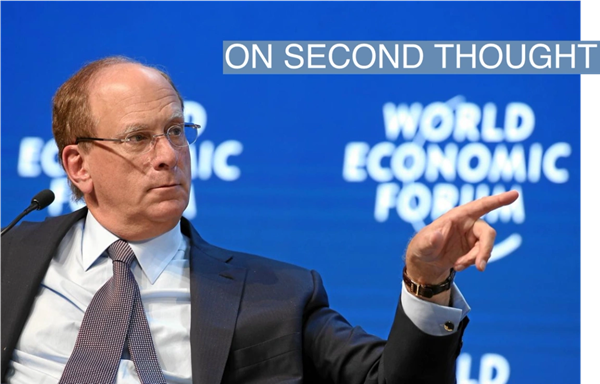
INTELLIGENT §
TRANSPARENT
§
GLOBAL
|
June 13, 2024

Business |
 Liz Hoffman
Liz Hoffman |
BlackRock conspiracy theory falls flat
THE NEWS
Congressional Republicans alleged this week that a vast left-wing
conspiracy in the machinery of corporate governance is pushing a
progressive agenda.
A House Judiciary Committee report accused
blue-state pension funds, climate nonprofits, global alliances,
activist investors, and giant money managers including BlackRock and
Vanguard, of forming an illegal cartel to force companies to cut their
carbon emissions, set diversity quotas, and curb their political
contributions.
It’s the latest jab in the fight over corporate boardrooms. A leftward
shift in the mid-2010s, turbocharged by #MeToo and Black Lives Matter,
has receded under a conservative backlash aided by economic turbulence
that refocused executives on the bottom line. As financial performance
retakes center stage for companies and investors, the furor has mostly
been pushed to the partisan edges, and a close reading of the House
report shows this fight has always been more commercial than
ideological.
At the center of this alleged cabal, Republicans claim, is Climate
Action 100+, a coalition whose membership of investors, banks, and
money managers controlled $68 trillion at its peak. Documents made
public by the committee show that BlackRock and State Street were
pressured into joining after Climate Action leaned on their clients —
pension funds, endowments, insurers, and sovereign wealth funds that
ultimately control the investments.
“Asset owners,” read minutes from a 2020 meeting of Climate Action’s
steering committee, “are in the best position to shift the frustrating
voting behaviors of the ‘big three,’” which the group had deemed
insufficiently pro-environment.
One of Climate Action’s founders wrote in a 2020 email made
public in the House report that “BlackRock was influenced to join” the
coalition by two of its clients. Japan’s $1.6 trillion government
pension fund moved $50
billion from BlackRock to another asset manager, UK-based Legal &
General, which had recently
dumped Exxon stock from its funds. Another major allocator,
Scottish Widows, made its contract with BlackRock contingent on the
firm joining the coalition, according to the email.
State Street, JPMorgan, and several other big asset managers quit
Climate Action this spring. BlackRock limited its
participation in the group to its international arm, taking its $6.6
trillion in US assets with it.

Flickr |
LIZ’S VIEW
The progressive shift at asset managers, principally BlackRock, look
less like an ideological conspiracy driven by Larry Fink’s “Davos man”
agenda of windmills, walkable cities, and lab-grown meat than a
commercial necessity.
If BlackRock, Vanguard, and State Street were pushing a progressive
agenda within corporate boardrooms, the documents in the House report
show they were being pushed in that direction by their own clients.
That’s why businesses do anything. Not to say that Fink didn’t believe
what he was saying about carbon emissions and diversity, or that he
didn’t think they were important contributors to corporate profits in
the long term. He also likely saw a chance to elevate his own profile,
becoming a leading voice in the corporate class. But cast in a new
light, he looks more like a CEO tweaking his company’s product because
some important customers stopped buying it.
There simply hasn’t been an organized “right” in investing that has
had the same commercial sway.
Progressive activists have succeeded in getting their causes on
corporate ballots, aided by a Securities and Exchange Commission which
has largely given up its role as gatekeeper. Conservatives, who argue
the SEC is biased toward left-leaning causes, have instead pulled
less-effective levers, like investment blacklists that can drive
up costs and are open to criticism by nonpartisan
fiduciaries that are just
trying to make money.
“Conservatives have completely ceded the ballot box to leftists, at
our peril,” Will Hild, the executive director of Consumers’ Research,
the conservative group backed by Leonard Leo, told Semafor in an
interview. A report released
this week by the group found there were 12 times as many left-leaning
shareholder proposals between 2018 and 2022 as conservative ones.
THE VIEW FROM BLACKROCK
BlackRock has been backpedaling from the forefront of the ESG
movement. Fink’s latest annual letter — which for years has served as
a soapbox for his warnings about climate change and urging companies
to take it seriously — was instead about a looming retirement crisis.
Its 2024 guidelines for corporate engagement stressed “financial
resilience” over ESG.
And it’s been rolling out the ability for individual investors in its
fund to vote for themselves. “The money BlackRock manages is not our
own—it belongs to our clients—and BlackRock is committed to providing
clients around the world with choices to support their unique and
varied investment objectives,” the company said
in its dropout letter to Climate Action in February.
BlackRock wants out of the business of making decisions that alienate
half the country — and get it implicated in allegations of a left-wing
cabal by House Republicans.
© 2024 SEMAFOR INC. |